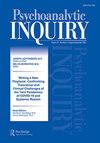Love’s Labor’s Lost: The Lived-Experience, A Pan-European Play
IF 0.5
4区 心理学
Q3 PSYCHOLOGY, PSYCHOANALYSIS
引用次数: 0
Abstract
ABSTRACT This article addresses Abel Lefranc’s analysis of Love’s Labor’s Lost. Lefranc was a member of the Académie française, a highly respected Renaissance specialist, who published Behind the Mask of William Shakespeare in 1918. Nothing in Shakespere of Stratford’s hundreds of business records or will (the only records we have) reveal any knowledge of French. He never travelled abroad. He was a teenager in Stratford when the events in the play take place. He possibly began to learn French when he roomed with a French Huguenot family in London at the age of thirty-eight in 1602; however, Hamlet, based on an untranslated French source, was presented in 1593. Love’s Labor’s Lost (1594–98) reveals a detailed knowledge of historical events at the French court of Nérac from 1578 to 1582 and presents important, as well as minor French historical characters, and even a suppressed scandal – a wealth of knowledge not available to the general public. There is no known primary source for the play. Whoever wrote the play knew in great detail what was happening at the court of Nérac between 1578–1582. Lefranc did a phenomenal amount of research to reveal the forgotten history behind the play – the lived experience and its pan-European vision. Restoring the history reveals the play’s rich psychological depth.爱的劳动的失败:生活的经验,一个泛欧洲的戏剧
本文论述了亚伯·勒弗兰克对爱的劳动迷失的分析。Lefranc是文艺复兴时期备受尊敬的专家法国学院的成员,他于1918年出版了《威廉·莎士比亚的面具背后》。斯特拉特福德的Shakespere的数百份商业记录或遗嘱(我们唯一的记录)中没有任何内容透露法语知识。他从未出国旅行。剧中事件发生时,他还是斯特拉特福德的一名青少年。1602年,三十八岁的他可能在伦敦与一个法国胡格诺派家庭同住时开始学习法语;然而,《哈姆雷特》是根据一个未经翻译的法语来源于1593年推出的。Love’s Labor’s Lost(1594–98)揭示了1578年至1582年法国内拉克宫廷历史事件的详细信息,并呈现了重要和次要的法国历史人物,甚至是一个被压制的丑闻——这是公众无法获得的丰富知识。这出戏没有已知的主要来源。无论是谁写的剧本,都非常详细地了解1578-1582年间内拉克宫廷发生的事情。Lefranc做了大量的研究,揭示了这部剧背后被遗忘的历史——生活经历及其泛欧洲愿景。还原历史,展现出该剧丰富的心理深度。
本文章由计算机程序翻译,如有差异,请以英文原文为准。
求助全文
约1分钟内获得全文
求助全文
来源期刊

Psychoanalytic Inquiry
PSYCHOLOGY, PSYCHOANALYSIS-
CiteScore
1.00
自引率
33.30%
发文量
65
期刊介绍:
Now published five times a year, Psychoanalytic Inquiry (PI) retains distinction in the world of clinical publishing as a genuinely monographic journal. By dedicating each issue to a single topic, PI achieves a depth of coverage unique to the journal format; by virtue of the topical focus of each issue, it functions as a monograph series covering the most timely issues - theoretical, clinical, developmental , and institutional - before the field. Recent issues, focusing on Unconscious Communication, OCD, Movement and and Body Experience in Exploratory Therapy, Objct Relations, and Motivation, have found an appreciative readership among analysts, psychiatrists, clinical psychologists and a broad range of scholars in the humanities.
 求助内容:
求助内容: 应助结果提醒方式:
应助结果提醒方式:


